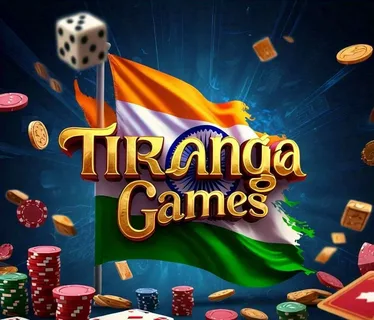Tiranga Game: The Eternal Symbol of India’s Spirit

Every nation has a symbol that unites its people and reflects its history. For India, that symbol is the Tiranga Game—the tricolour flag that embodies freedom, unity, and the collective dreams of over a billion citizens. Adopted just before independence in 1947, the Tiranga has since become more than just a national emblem; it is the heartbeat of India, fluttering proudly on the Red Fort, in schools, and in the hearts of people everywhere.
The Meaning Behind the Tricolour
The Tiranga is not a random combination of colours; every shade and symbol was chosen with deep thought:
-
Saffron at the top inspires courage and selflessness, reminding Indians of the sacrifices made by freedom fighters.
-
White in the middle conveys peace, truth, and honesty, essential for harmony in a diverse nation.
-
Green at the base symbolizes prosperity, agriculture, and the connection between people and nature.
-
The Ashoka Chakra, with 24 navy-blue spokes, reflects justice, constant progress, and the eternal cycle of life.
This thoughtful design transforms the Tiranga into a moral compass, guiding the nation toward unity and growth.
The Journey of the Flag
The Tiranga’s journey mirrors India’s struggle for independence. In the early 1900s, several flags were used during protests against British rule. But the final version, designed by Pingali Venkayya, became the unifying emblem of freedom. On 22 July 1947, the Constituent Assembly adopted it as the national flag. When India awakened to independence on 15 August 1947, the lowering of the British Union Jack and the rise of the Tiranga marked a powerful moment in history.
Tiranga in National Life
Every year, the Tiranga takes center stage during Independence Day and Republic Day. When the Prime Minister hoists it at the Red Fort or when it leads the grand parade in New Delhi, millions of Indians feel their hearts swell with pride.
But beyond official functions, the Tiranga lives in daily life. Children wave it on the streets during festivals, fans carry it into stadiums to cheer for India, and people display it on vehicles, clothes, and even digital profiles to express patriotism. Campaigns like Har Ghar Tiranga have made the flag a household symbol, strengthening its presence across the country.
The Code of Respect
The Tiranga is not an ordinary piece of cloth—it is protected by the Flag Code of India, which ensures its dignity is preserved. The rules emphasize that it should never touch the ground, be used for commercial purposes, or be flown below any other flag. Damaged flags must be respectfully disposed of, often by private burning. These practices highlight the sacredness of the Tiranga and remind citizens to treat it with honor.
The Tiranga Abroad
For Indians living across the globe, the Tiranga serves as a bond to their homeland. It is proudly displayed during Independence Day events in foreign cities and waves high at global sporting events. At the United Nations headquarters or during international summits, the Tiranga stands tall, representing India’s identity, diversity, and democratic spirit on the world stage.
A Symbol of Sacrifice and Hope
Every time the Tiranga flies, it carries with it the memories of countless sacrifices. Freedom fighters, leaders, and ordinary citizens risked their lives to see it unfurl in a free nation. Today, it continues to inspire new generations to contribute toward building a stronger India. The flag is not just about the past—it is also a symbol of the country’s hopes for the future, reminding every Indian of their role in shaping the nation.
Conclusion
The Tiranga Game is the soul of India, woven into its history and daily life. Its three colours and the Ashoka Chakra tell the story of sacrifice, peace, progress, and prosperity. From the fields of rural villages to the tallest skyscrapers of modern cities, the Tiranga unites all Indians under one banner.
To respect the Tiranga is to respect India itself—its struggles, its diversity, and its vision for tomorrow. As long as it flutters proudly in the sky, it will continue to remind every citizen of their duty and their pride as an Indian.
- Jogos
- Religion
- Party
- Networking
- Music
- Literature
- Art
- Health
- Gardening
- Shopping
- Food
- Fitness
- Film
- Drinks
- Dance
- Crafts
- Causes
- Wellness
- Devotional Reflections
- Bible Study & Scripture Insights
- Prayer & Worship
- Christian Living
- Spiritual Growth & Discipleship
- Testimonies & Personal Journeys
- Christian Theology & Doctrine
- Church Calendar & Liturgical Seasons
- Christian Service & Mission
- Gardening
- Health
- Início
- Literature
- Networking
- Outro



